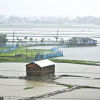Agriculture insurance still elusive

Cyclone Sitrang is over and the weather is forecast to be sunny today. But for thousands of people in Bangladesh, including farmers, it is rather gloomy.
This is because the cyclone lashed their crop fields and washed away fish farms, particularly in the coastal region, devastating their efforts aimed at making fortune.
Sukesh Rakkhit, a farmer in Dumuria upazila of the southwestern district of Khulna, and Mohammad Jewel Hossain, a shrimp and fish farmer in Rupsha upazila under the same district, are two growers who could face huge losses for the cyclone, which swept over the country on Monday night.
Rakkhit estimates his losses for damages to his papaya and other vegetable fields to be Tk 500,000. For Hossain, who saw his fish farms and shrimp enclosures inundated, the losses would be around Tk 600,000.
"I don't know how to recoup the losses," said Hossain.
Like him, thousands of farmers today are helplessly staring at losses in the absence of cushion or insurance coverage.
The government and various other stakeholders have long been calling for introducing agriculture insurance in Bangladesh in order to mitigate risk of farmers in the event of losses resulting from floods, cyclone, droughts, unseasonal and excessive rains, and other weather-related events.
Yet, no insurance scheme has come forth so far to shield food producers.
Until now, efforts to introduce agriculture insurance have remained largely limited to piloting schemes, including the ongoing one by state-run Sadharan Bima Corporation (SBC).
But average annual costs of disasters are $300 million, according to the Bangladesh Agriculture Insurance Situation Analysis published by the World Bank Group in 2018.
Only one insurer, Green Delta Insurance Company (GDIC), has so far incorporated crop insurance as a commercial product.
A pilot scheme -- Weather Index-based Crop insurance – has been underway since 2021, in partnership with Brac and Syngenta Foundation and under a Swiss Agency for Development and Cooperation-supported Bangladesh Microinsurance Market Development Project.
SBC and GDIC are offering crop insurance policies to farmers under the project. And participants said they got positive responses from farmers.
Under the scheme, farmers get coverage against weather perils like drought, unseasonal rainfall, and low and high temperature, said Monirul Hoque, lead of the non-life insurance under the microfinance programme of Brac.
"We have already settled a number of claims to boro paddy and potato farmers, and farmers are positive. Quick claim settlement is the biggest marketing tool."
According to Hoque, there is a business case for agriculture insurance in Bangladesh.
"Farmers are looking for resilience support and it is our responsibility to take effective insurance models to them with proper understanding of their requirements," he said.
Under the project, Brac provided coverage to 966 farmers in 2021 when it launched the scheme. The number of farmers under the coverage has grown to 1,093 this year.
The NGO plans to expand crop insurance benefits to rice, potato and vegetables through up to 50 of its branches soon.
"We will continue with our own capacity, if needed," said Hoque.
He, however, added: "It is important to build long-term partnership and embrace initial losses, learn from mistakes and innovate for the sustainability of an agriculture insurance."
Hoque said there should be investment in capacity development for pricing, developing a proper training institute, attracting young generation and investing in them, and adopting most advanced technology for a climate-insurance success in the long-run.
GDIC has so far supported 600,000 farmers since 2015.
It settled claims worth nearly Tk 8 crore for 100,000 plus farmers this year alone, said Md Maruf Hossain, deputy vice-president for impact business team of the private insurer.
"We are giving up to 100 per cent coverage depending on risk factors," he said. GDIC plans to launch fisheries insurance next year.
Maruf, however, said there is no insurance for farmers who suffer losses for crop damages because of cyclones.
The bottleneck behind introducing insurance schemes to reduce the losses of farmers is inadequacy of data of cyclone and its impact in the past years.
GDIC has developed the weather-based index based on 40 years' weather data.
A senior official of SBC said the crop insurance is beneficial for farmers but the premium amount becomes high if weather and other data have to be purchased for analysis and product development.
"There is an issue of affordability of farmers," he said, calling for the government's intervention, subsidy and participation of the agriculture ministry.
Insiders say the government should prepare a guideline for the agriculture insurance by involving all stakeholders.
At the same, the National Board of Revenue should waive value-added tax on premiums paid by farmers, with a view to encouraging crop, livestock and other agri-related insurance.
Ali Tareque Parvez, social finance fellow on inclusive insurance for Cambodia, Myanmar and Indonesia at the International Labour Organisation, said the private sector, especially insurance companies, should come forward.
"If they take initiative, the government's involvement will automatically come," he said.
He said there is a strong demand for microinsurance from marginal people.
"People are looking for such solutions but can't afford it completely on their own," Parvez said, adding that Bangladesh has a strong network of microfinance institutions, and NGOs that can be a catalyst in rolling out micro and agriculture insurances.
Mohammad Jainul Bari, chairman of the Insurance Development Regulatory Authority, said the regulator is encouraging other companies too to introduce agriculture insurance.
Commenting on insurance for farmers suffering crop and other losses for cyclones, he said a study is needed to assess the intensity of risks.
"Based on that, companies will decide whether they will offer the insurance or not. People should come forward."
Farmers Hossain and Rakkhit don't understand the complexity standing in the way of the crop insurance. They, however, realise that the availability of insurance will provide them much-needed cushion from losses inflicted by cyclone-induced damages.



 For all latest news, follow The Daily Star's Google News channel.
For all latest news, follow The Daily Star's Google News channel. 







Comments